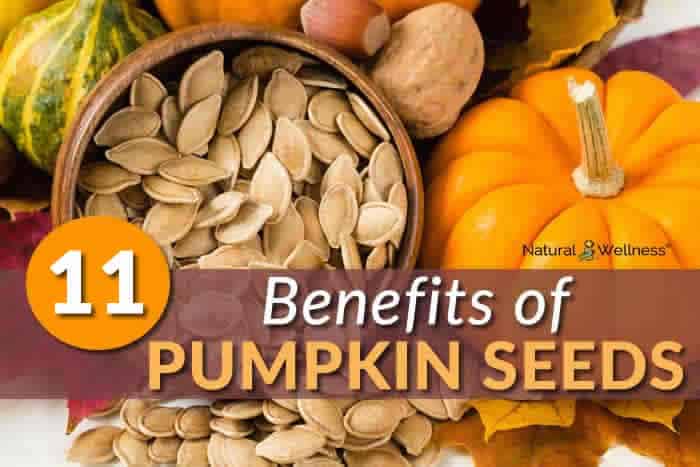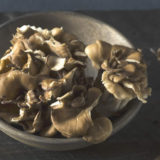

For most people, pumpkins mean Halloween Jack O’ Lanterns and pie for dessert on Thanksgiving Day – wonderful uses to be sure; but the best, most nutritious part of the pumpkin – its seeds – usually goes to waste. Like most edible seeds, those found in the cavity of pumpkins are packed with nutrition that carries an array of health benefits.
Moreover, when toasted with your favorite seasonings, the result is a delicious way to get a ton of good nutrition and a satisfying between-meal snack.
Below we take a look at 11 health benefits of pumpkin seeds.
1) Pumpkin Seeds Are Loaded With Essential Nutrients
One ounce of pumpkin seeds only has 151 calories (primarily from fat and protein), and is filled with essential nutrients, including:
- Fiber – 1.7 grams
- Carbohydrates – 5 grams
- Protein – 7 grams
- Fat – 13 grams (including 6 omega-6s)
- Vitamin K – 18% of the reference daily intake (RDI)
- Phosphorus – 33% of the RDI
- Manganese – 42% of the RDI
- Magnesium – 37% of the RDI
- Iron – 23% of the RDI
- Zinc – 14% of the RDI
- Copper – 19% of the RDI
Some of these nutrients are especially beneficial if you aren’t getting them elsewhere. For example, pumpkin seeds are one of the best sources of magnesium, which is lacking in most diets. In the US, about 79% of diets have less magnesium than the recommended amount.
Magnesium is needed for a lot of functions, including controlling blood pressure, reducing the risk of heart disease, healthy bone support, and regulating blood sugar levels.
Similarly, pumpkin seeds’ high levels of fiber help support digestive health and reduce the risks of diabetes, heart disease and obesity. (1)
2) Pumpkin Seeds Are Full of Antioxidants
Pumpkin seeds have antioxidants in them, including carotenoids and vitamin E. They work as anti-inflammatories and shield your cells from free radicals.
One study found that the antioxidants found in pumpkin seed oil helped reduce inflammation in rats with arthritis, without causing any side effects. (1)
3) Prostate Health
Numerous studies have shown that beta sitosterol, the plant fat found in pumpkin seed oil, had beneficial effects in patients with prostate cancer, benign prostatic hypertrophy (BPH) and general prostate discomfort.
In Europe, doctors recommend a combination of pumpkin seed oil, saw palmetto, nettle and zinc for prostate related problems.
4) Pumpkin Seeds Help Fight Cancer
Along with prostate cancer, pumpkin seeds have also been found to help reduce the risk of breast, lung, stomach, and colon cancer.
Studies suggest that the lignans found in pumpkin seeds play a major role in fighting breast cancer. One large study found that postmenopausal women reduced the risk of breast cancer by eating pumpkin seeds.
5) Neurological and Muscle Function
Adequate levels of magnesium in the blood are necessary for healthy function of muscles and nerves. Studies have demonstrated that when taking magnesium supplements to relieve muscle cramps, women reported a reduction in pain and incontinence associated with overactive bladder. It is thought that the magnesium relaxes the muscles in the bladder wall, thereby reducing the contractions causing the urinary urgency and incontinence.
6) Pumpkin Seeds Even Support Bone Health
Most people are aware of the necessity for adequate dietary calcium in order to support healthy bones. What many don’t realize is that healthy bones require other essential minerals like magnesium, phosphorus and zinc for normal bone support. Pumpkin seeds provide these nutrients as well as anti-inflammatory agents which help prevent or alleviate arthritis.
7) Circulatory Function
Pumpkin seeds provide a good dietary source of phytosterols, the powerful antioxidant and anti-inflammatory agents that protect the heart and circulatory system by reducing LDL cholesterol and triglycerides while increasing the blood levels of HDL (good) cholesterol.
In addition, these fiber-rich seeds also contribute to improved blood lipid values by promoting improved digestion and increased bowel motility, which enhances the body’s natural cleansing mechanism.
8) Pumpkin Seeds Can Reduce Blood Sugar Levels
Studies show that pumpkin seeds – as well as pumpkin juice, powder, and pumpkin in general – can reduce blood sugar. This is beneficial to those afflicted with diabetes or people who simply need to watch their blood sugar levels.
This may be due to the high levels of magnesium found in pumpkin seeds. One observational study on over 127,000 patients found that high magnesium diets lead to a 33% lower risk of type 2 diabetes in men and 34% for women. (1)
9) Men’s Reproductive Health
Pumpkin seeds may help give men healthier sperm. Studies have found that diets with less zinc in them may lead to poor sperm quality in men. Being that pumpkin seeds have a substantial amount of zinc in them, they could potentially improve men’s sperm health.
One study performed on mice found that pumpkin seeds might also protect sperm from harm caused by chemotherapy and autoimmune diseases. (1)
10) Eating Pumpkin Seeds Can Lead to Better Sleep
Those suffering from insomnia may want to consider a few pumpkin seeds before going to bed. They are a natural source of tryptophan (the amino acid usually found in turkey causing you to nap after Thanksgiving dinner).
Along with that, the magnesium and zinc found in pumpkin seeds will also help improve your sleep quality. (1)
11) Nothing New
Though science is still discovering the full array of benefits of pumpkin seeds, their medicinal use has been around for a while. Native Americans are known to have used the seeds for ailments like intestinal worms and urinary problems, and Chinese medicine has used pumpkin seeds since the 17th century.
No Spoonful of Sugar Necessary
One of the best things about pumpkin seeds is the taste. By tossing them with some olive oil and a little sea salt, you can create a really tasty snack that delivers a ton of good nutrition in every bite.
For a light, healthy snack consider eating about one ounce of pumpkin seeds, that will only be about 151 calories and be loaded with nutrients for you. Enjoy and have a happy fall!





I definitely like sunflower seeds. Not sure that I’ve ever tried pumpkin seeds, but I’d like to!
I use them when I make home made chex mix